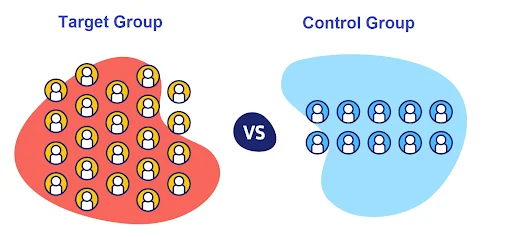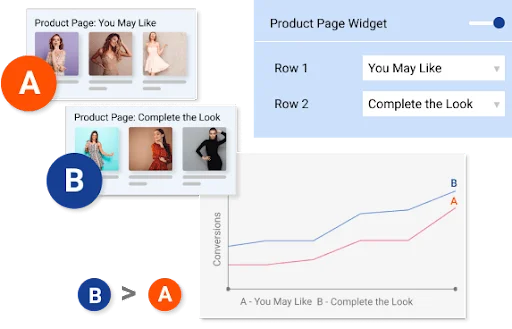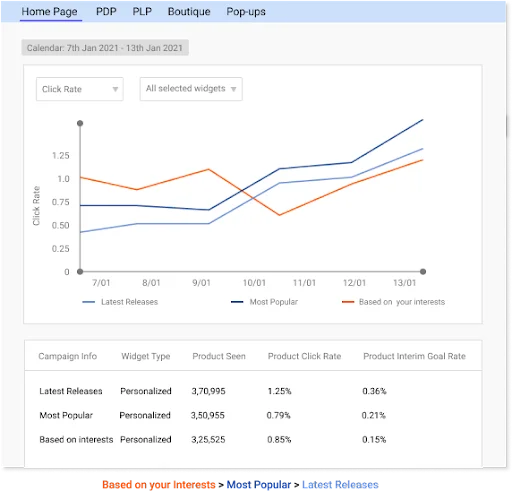Professionals invest significant resources in crafting optimized, personalized campaigns, aiming to boost revenue with the help of customer engagement tools.
But are you sure that it is your campaigns that are driving the business numbers? How much do your marketing campaigns actually affect customer behavior?
How can you figure out if it was your Diwali blockbuster campaign that shot up apparel sales, or was it the festive season that you should be attributing the sales numbers to?
It may not be the campaigns always that you can attribute your rising (or stagnant) revenues to.
Well, it isn’t too hard to find out.
This is where Control Group Testing comes into play. With Netcore’s customer engagement platform, you can harness this feature to enhance the impact of every marketing campaign you launch, ensuring your efforts align with genuine customer engagement solutions.
What are Control Groups?
A control group, within the context of a customer engagement platform, is a section of the customer segment you are targeting with a campaign to whom you DO NOT send the marketing campaign. The rest of the customers to whom you send the campaign constitute the test group.
You then track and measure specific activities (that you intended to promote via your campaign) of both the control group and the test group. The difference between the performances relevant to both groups gives you eye-opening insights into how effective and profitable your campaign is.

Why are Control Groups Important?
To exclude a segment of customers from your marketing campaigns is always a hard pill to swallow. On the surface, it equates to a loss in potential revenue or customer engagement getting impacted, but control groups are critical to the long-term success of your overall marketing strategy.
Here are the two major reasons why control groups are significant:
A. Identify and eliminate unnecessary marketing spends
Imagine a customer who wants to buy a Bluetooth speaker from an ecommerce app. They almost complete the purchase but the transaction does not go through. As a result, the customer drops off.
The next time they launch the app, they receive an in-app message offering a whopping 20% off on that very brand of speakers and go ahead to complete the transaction.
In such a scenario, did the in-app marketing campaign specifically result in a conversion, or was the customer in question going to purchase the item regardless?
For a marketer, it may appear that the promotional campaign was the winner. Actually, the ROI is lower because you did not have to necessarily spend the offer to gain this conversion.
Control group testing, a crucial feature of a customer engagement platform, can highlight customers who would convert even without additional incentives.
B. Recalibrate the Marketing Strategy
If the control group behaves the same way as your test group, it clearly states that the campaign was pointless.
The last thing you want to do is to invest in a campaign you don’t need to. Control group testing, a feature in many customer engagement platforms, provides a straightforward method to discern effective strategies from ineffective ones.
4 Tips to Help You Conduct Effective Control Groups Testing
While control groups are usually a random subset of customers culled from the overall set, there are certain points you must keep in mind to ensure that meaningful insights are unearthed:
1. Consider a significant group size:
If your control group comprises only a handful of customers (say 50-100), and 100% of them pass your behavioral test, you cannot trust the results.
The group should represent a good mix of the audience that you are trying to gain insights about. Typically, the control group should be about 10% of the campaign or test group’s size when using a customer engagement platform.
2. Ensure you aren’t comparing apples to oranges:
If the control group comprises all male millennials living in Mumbai, and the test group constitutes female users above 40 years of age and living in Chennai, and you are testing a campaign promoting IPL tickets for a match in Mumbai, the results of control group testing would be utterly meaningless. So, compare two groups that are actually comparable.

3. Limit the number of variables you want to measure:
Too many variables may prevent you from getting actionable and reliable insights. For instance, if you’re evaluating the impact of a sales promotion campaign using a customer engagement platform, concentrate on measuring conversions to get clear results.

4. Allow the test to take the time it requires:
Occasions, days of the week, holidays, seasons, etc., play a role in the performance of a campaign. Also, the longer a test runs, the more likely that you’ll be able to produce statistically significant results
When Should Control Groups Not be Used?
Utilizing control groups is a valuable strategy within a customer engagement platform, but it’s not always the go-to method for every campaign. There are instances when reaching your entire audience is paramount.
- If your campaign is regarding an update in your app, or a revision in your subscription policy, or breaking news, you want your entire audience to receive the message. For such essential and urgent notifications, control group testing can be avoided.
- If the size of the recipient audience is quite small, then control groups would not give very significant results. Typically, if your audience size is less than 1,000, the results from a customer engagement tool like control group testing might not be as revealing.
For data-driven marketers, it is risky to assume that sending a message can only improve the business objectives, or whenever a user receives a message and then does something valuable, the message is what drove the valuable action.
Conclusion
As someone keen on leveraging customer engagement platforms, it’s essential to recognize that not every message directly influences business outcomes. It’s a misconception to believe that every valuable user action is solely a result of the message they received.
Control groups are the unsung heroes of effective marketing campaigns. Think of them as the magnifying glass that brings clarity to your strategy’s real impact. Without them, you’re essentially navigating the vast ocean of customer engagement without a compass.
Now, if you’re serious about elevating your marketing game, you shouldn’t miss out on what Netcore Cloud has to offer.
Book a demo and let us showcase how our platform, armed with the power of control groups, can be the catalyst your business needs to thrive.







